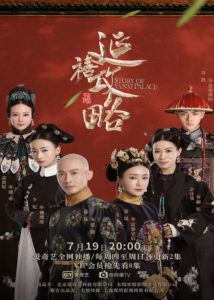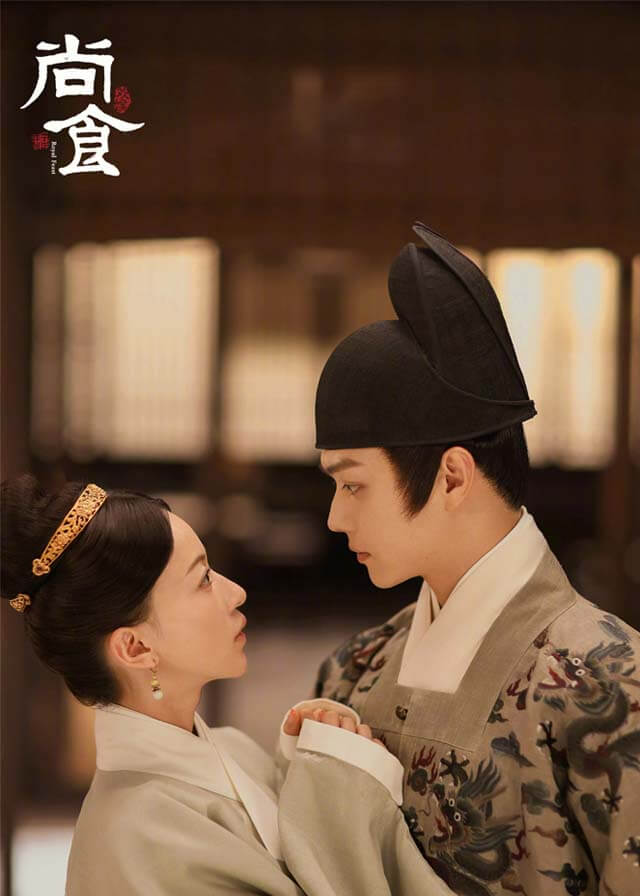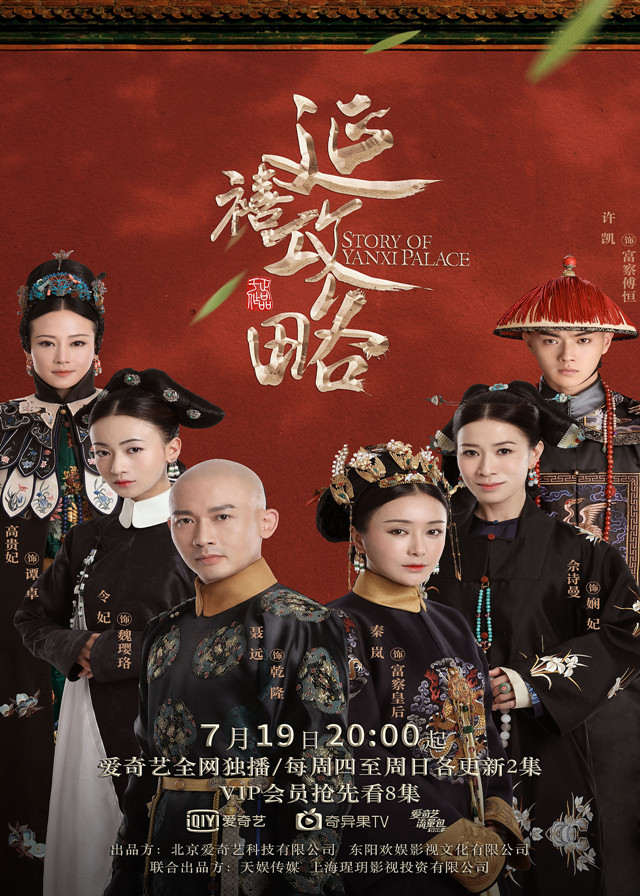Royal Feast Episode 38 Recap
> Royal Feast Recap
Yuan Qi informed Zhu Zhanji that Datura stramonium pollen, used in Wu Zhaoyi's fragrance, along with its antidote, had been discovered in a secret compartment at Wu Zhaoyi's residence. Wu Zhaoyi, now facing serious accusations, questioned when Zhu Zhanji had started to suspect her. The Emperor then summoned his ministers, and among them was the British Duke, whose presence caused a visible shift in Wu Zhaoyi's demeanor.
The British Duke confessed that Han Wang's special envoy had indeed attempted to persuade him to join the rebellion the previous night. Zhu Zhanji revealed that this was part of his intricate "bitter plan" with the British Duke, which had even fooled those close to him. Chen Wu reported that Dongchang had apprehended eight spies sent by Han Wang into the capital, and further interrogations led to the capture of all Han Wang's secret agents within the palace.
It was also discovered that Han Wang's men had contacted sixteen military commanders, mostly former colleagues, including generals from the Five Army Camp and Three Thousand Battalion, who were prepared to support Han Wang's uprising from behind and seize the capital. Zhu Zhanji expressed his profound disappointment, noting Han Wang's repeated attempts to infiltrate the court and his brazen manufacturing of weapons in Le'an, despite the Emperor's consistent leniency and trust.
The court agreed that Han Wang's treason was undeniable and unforgivable. Zhu Zhanji asserted that everything remained firmly under his control, leaving the fate of the Empress, who was now understood to be a pawn in a larger scheme, hanging in the balance. Wu Miaoxian was then led away for trial. Yao Zijin approached Wu Miaoxian, asking if she had been coerced and why she hadn't defended herself during the trial.
Wu Miaoxian, with tears in her eyes, confessed she was a spy, born into Han Wang's household as a slave. Her parents, younger brother, and sister were all held captive by Han Wang, who constantly threatened her family to force her to sow discord in both the harem and the court. She explained that she had to maintain a delicate balance, neither too favored nor too disgraced, to avoid becoming expendable.
She had adopted the persona of a delicate and foolish Wu Miaoxian, a role she admitted she had come to believe herself and even enjoyed. Han Wang's increasing pressure led her to concoct the scheme to depose the Empress, a desperate gamble for leverage, though she knew it was unlikely to succeed. She believed the Empress's downfall would cause disunity among loyal ministers and turmoil in the court.
When Yao Zijin questioned why she hadn't been killed if it would have been more effective, Wu Miaoxian acknowledged that indeed, killing Yao Zijin would have thrown Zhu Zhanji into greater disarray. However, she then revealed that throughout her life, no one had ever shown her genuine warmth or covered her with a quilt when she was cold.
She considered her survival a repayment for Yao Zijin's kindness, and as she was led away, her final plea was for Yao Zijin to rescue her family if possible. Meanwhile, Su Yuehua was imprisoned. Yin Ziping visited her in jail, informing her that the Emperor had been aware of her actions all along.
Yin Ziping recounted how she had suspected Su Yuehua from the moment she accepted Wu Miaoxian's proposal to harm Zi Jin, and she had reported this to the Emperor, who instructed her to let Su Yuehua proceed to expose the full extent of the plot. Yin Ziping further revealed that the vegetarian meal Zi Jin had consumed was not the poisoned one Su Yuehua had personally prepared.
Yin Ziping accused Su Yuehua of betraying the trust of Wang Sishan, who had poured her life's work into teaching her, and questioned if Su Yuehua was worthy of Meng Shang Palace, who had sacrificed herself to save her. Su Yuehua retorted, dismissing Yin Ziping as a "lowly commoner, petty thief" who was merely lucky.
In a fit of despair and rage, Su Yuehua seized a stool and violently smashed her right hand, declaring that since she could never become the head of the Food Bureau (Shang Shi) and no longer wished to cook, she would cripple her hand, proclaiming that she had now repaid her debts.
Yao Zijin sought to intercede on behalf of Wu Miaoxian, but Zhu Zhanji told her that they would discuss it upon his return, as he was preparing to lead a personal expedition against Han Wang. On the first day of August in the first year of Xuande, Han Wang Zhu Gaoxu launched his rebellion.
Emperor Zhu Zhanji entrusted Zheng Wang Zhu Zhan Jun and Xiang Wang Zhu Zhan Shan with overseeing affairs in Beijing and personally led a large army to Le'an. The Queen Mother summoned Zheng Wang Zhu Zhan Jun, severely reprimanding him for his negligence in guarding the capital, especially after the recent earthquake, drought in Shandong, and Han Wang's rebellion caused a massive influx of refugees into the city.
She chastised him for ordering the city gates closed, which prevented the desperate populace from seeking safety. She then convened a meeting with high-ranking officials, including Guangping Hou Yuanrong and Wu'an Hou Zhengheng. She decreed that soldiers be stationed at the city gates to register incoming refugees, conscripting able-bodied men aged fifteen to fifty to repair damaged city walls and homes, providing them with food and clothing.
She ordered the opening of reserve granaries for disaster relief and offered incentives for wealthy citizens to donate grain, promising official recognition and tax exemptions. She also mandated severe punishment, including confiscation of property, for any official found to be corrupt or derelelict in their duty during the relief efforts. She instructed Xiang Wang Zhu Zhan Shan to strengthen the city's defenses and watch for suspicious individuals.
As punishment, Zheng Wang Zhu Zhan Jun was ordered to consume only water for three days, to experience the plight of the hungry. Afterward, the Queen Mother also advised Yao Zijin to curtail palace expenses, anticipating harder times for the capital. While Zhu Zhanji was away, he discussed his strategy with Yuan Qi, explaining that his absence from Beijing would allow the Queen Mother to discern who was truly trustworthy and capable.
Meanwhile, You Yifan, having feigned an old injury to remain in the capital, saw the moment as opportune. He secretly dispatched a message to his "adoptive father," implying Han Wang, confirming that Beijing's defenses were weakened due to the emperor's departure and that it was an opportune time to attack. The Queen Mother, accompanied by Yao Zijin and the Empress, went to inspect the disaster areas outside the palace.
The situation was graver than anticipated; despite the opening of granaries, the sheer number of refugees meant food was insufficient, and many children suffered from abdominal pain after mistakenly eating poisonous roots. The Queen Mother, exhausted from her ceaseless efforts to manage the crisis, fell ill. She discussed her concerns with Xiang Wang Zhu Zhan Shan regarding the slow arrival of grain from distant provinces like Shanxi due to Han Wang's rebellion disrupting transport.
She ordered the livestock and produce from the imperial Shanglinyuan to be exchanged for grain. She also reinstated an old custom of allowing common people access to parts of the royal hunting grounds for foraging and instructed officials to encourage wealthy merchants and temples in Beijing and surrounding rich counties to provide food and lodging to refugees in exchange for labor, by spreading news of high grain prices in the capital.
Seeing the Empress's fatigue, the Queen Mother gently inquired if she could take charge of the situation should she need to rest. The Empress appeared hesitant. Yao Zijin, however, offered her full support, assuring the Queen Mother that she would take charge of managing the refugee crisis and stabilizing them. During this inspection, the crowd surged, and the Queen Mother nearly fell, prompting Yao Zijin and others to quickly escort her back to the palace.
Back at the palace, the Empress, after much contemplation, prepared her old medical instruments. Yao Zijin presented a detailed list of jewelry and fine silks donated by the harem concubines to the Empress. The Empress, without even reviewing the list, handed it back to Yao Zijin, instructing her to manage the donations. The Empress declared her intention to personally visit the "disease workshop" (hospital) in the disaster area to treat the sick who couldn't afford care.
Yao Zijin expressed concern for the Empress's safety, given her noble status, but the Empress insisted, stating that she was not delicate and that a doctor must see the patients to prescribe effectively. She mentioned that her maternal grandfather had left her many valuable creams for treating difficult diseases. At the disease workshop, a distressed mother brought her child, who had been bitten by a poisonous insect.
The Empress, without hesitation, personally sucked the venom from the child's wound, saving the child's life. Yao Zijin witnessed this act of compassion and greatly admired the Empress's benevolence. The Queen Mother, burdened by anxiety over the ongoing disaster, lost her appetite. Despite the Food Bureau's varied attempts, the meals were consistently returned untouched.
Yao Zijin, having observed the Queen Mother's medical records, noted that her stomach illness stemmed from emotional distress and suggested adjusting her herbal medicine to a more appropriate "Yiqi Ziye Decoction" with longan meat as a medicinal guide. The Queen Mother agreed to this change. Yao Zijin then ensured that the Queen Mother received regular nourishment. Sensing the Queen Mother's continued worry over food shortages, Fang Dian Shan, a food canon, stepped forward, offering a solution.
She revealed that years ago, Meng Shang Palace had foresightedly instructed a select group of palace maids to collect discarded leftovers and cold dishes, which were then processed into "grain bricks" by mixing and pressing steamed radish with glutinous rice. These bricks were then naturally air-dried until they became hard and durable, easily stacked and concealed without attracting suspicion. This innovative method had effectively extended the food's shelf life, and now, in the face of widespread famine, these stored provisions could finally serve their purpose and save countless lives.





















